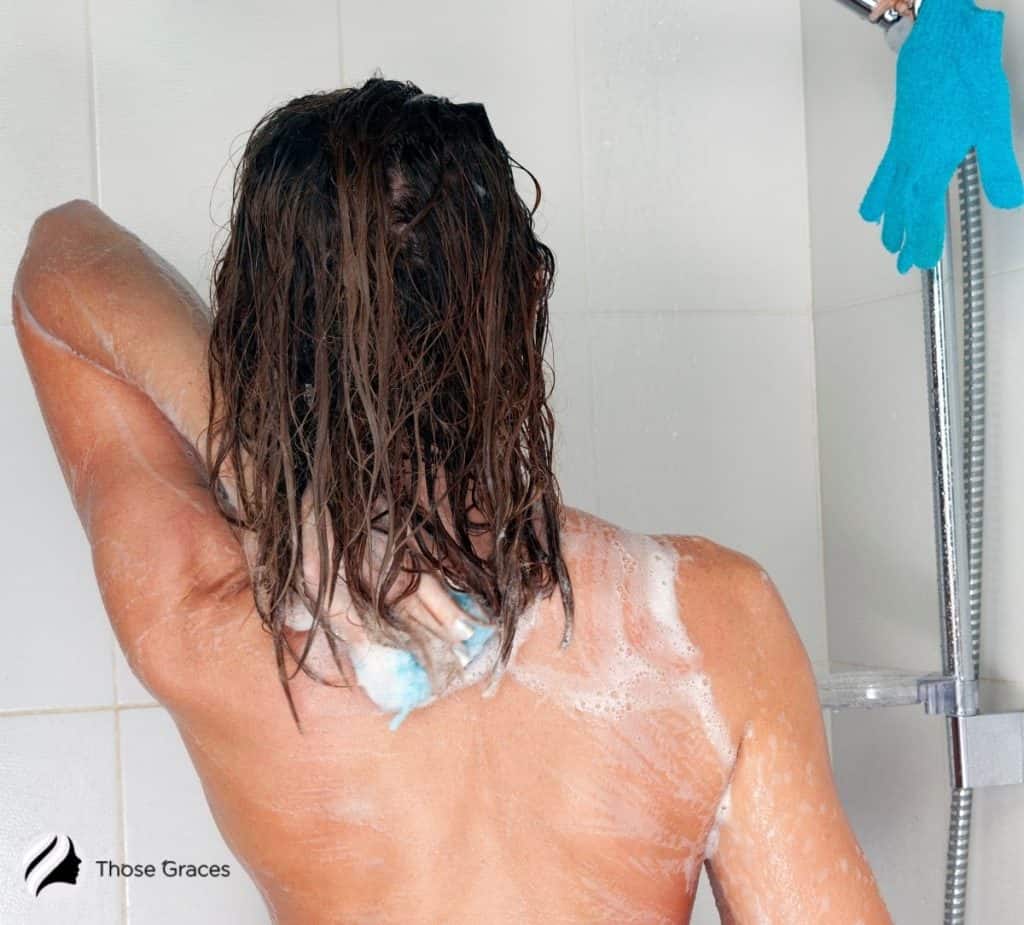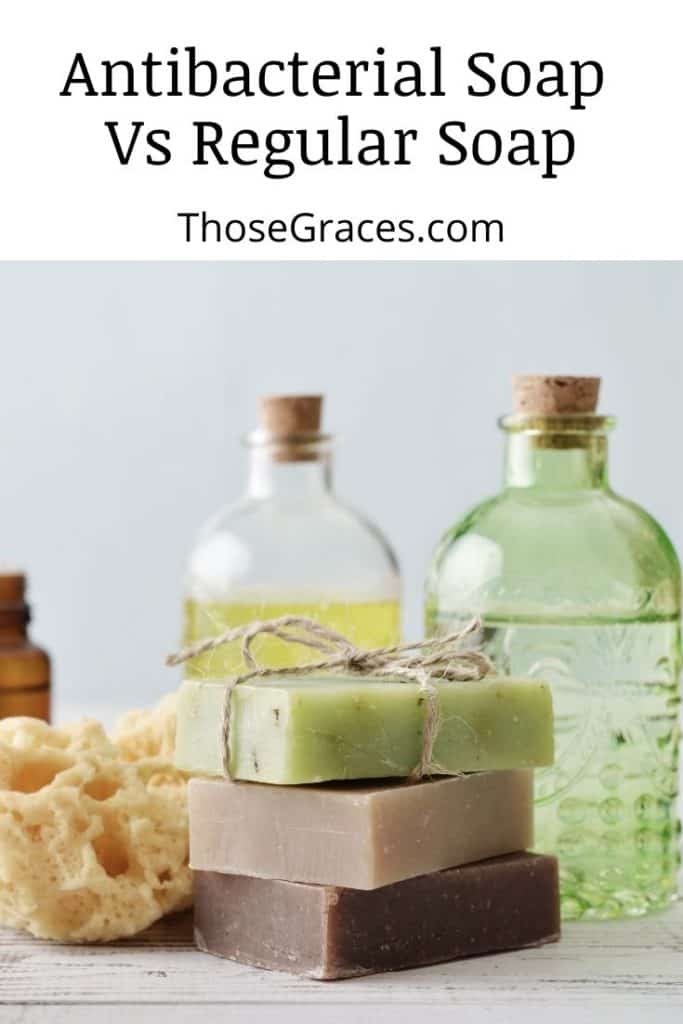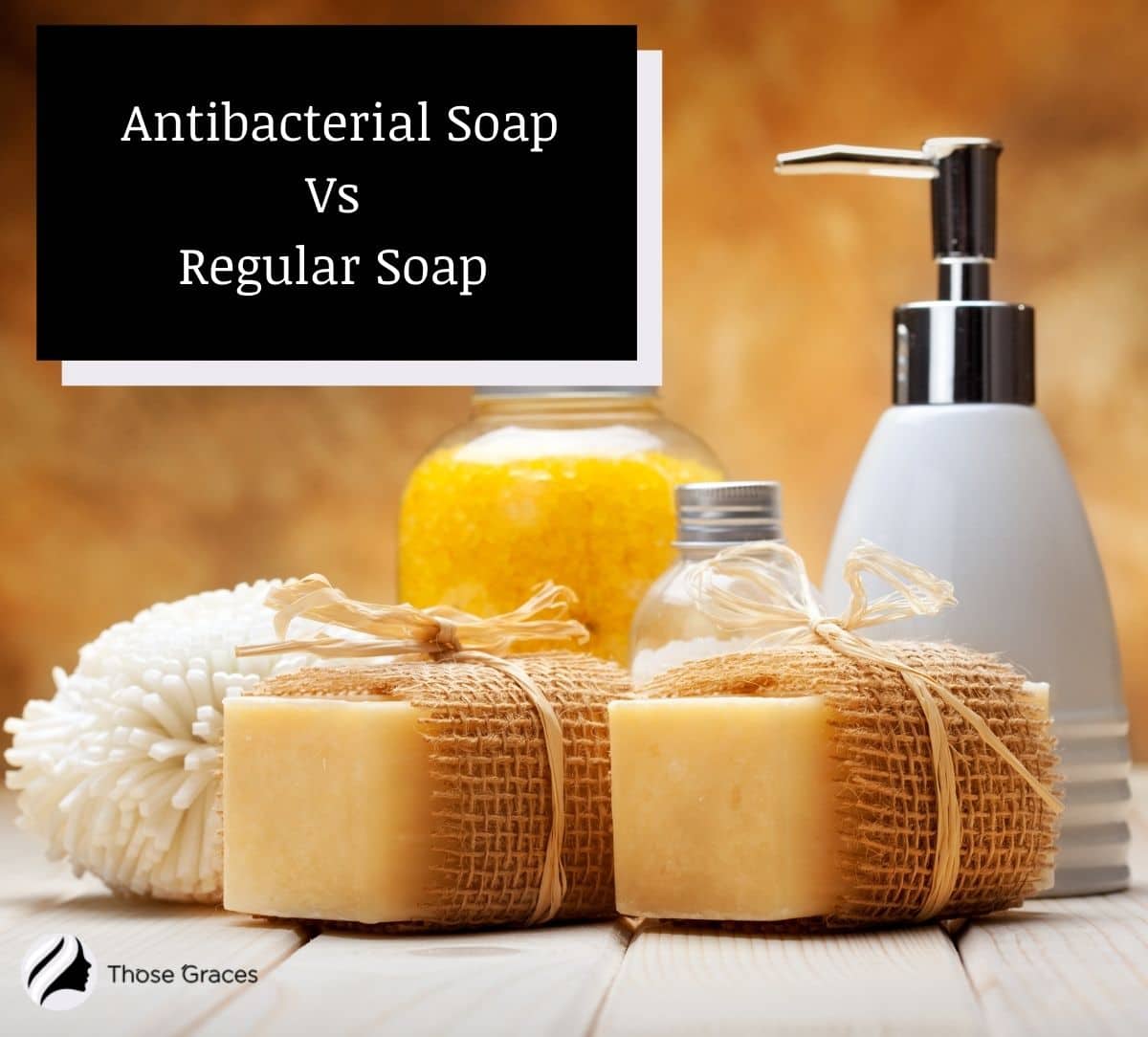Antibacterial vs. regular soap can be confusing…after all, isn’t all soap antibacterial?
To make it even more confusing, antibacterial soaps are split into subcategories like antibacterial body wash for body odor, for sensitive skin, for the body in general and specifically for hands.
But do any of these REALLY work and are they a better choice than regular soap?
Let’s dig in and find out.
Table of Contents
Antibacterial Soaps

Antibacterial soaps are increasingly popular on supermarket shelves. In fact, last year they were so popular that they were hard to find!
These special soaps typically contain biocides like triclosan that aren’t in regular soap.
It makes perfect sense that a soap that contains an antibacterial agent will offer superior cleaning power. Therefore, it is not surprising that these kinds of products enjoy success.
How Does Antibacterial Soap Work?
Antibacterial soap works thanks to the addition of chemicals or biocides, including triclosan that are not in plain soaps. Or at least that is the general claim such antibacterial products make.
In truth, the FDA claims that there is not enough scientific proof to back these claims up.
According to an article on the official FDA website, there is not enough proof that soaps claiming antibacterial properties are better at cleaning and disinfecting than regular soap.
Studies also don’t back up that antibacterial soap for body does any better than normal soaps at stopping bacteria or infection. In fact, they may actually be harmful when used too often.
The active ingredient in many of these liquid soaps is triclosan, and along with other so-called antibacterial chemicals, it faces scrutiny from many regulatory groups.
Comprehensive laboratory studies, mostly animal studies, suggest that triclosan alters the way that some hormones work.
In 2019 the FDA began proceedings to ban the marketing of personal hygiene products containing triclosan and triclocarban (another popular ingredient in antibacterial soaps).
It’s also important to note that both these compounds are seeping into our environment and even into our own bodies. For instance, triclocarban has been found in breastmilk.
Regular Soap

The exact way in which humankind discovered soap is unclear. Some legends suggest that rain washed the animal fats and ash from a sacrificial fire onto a river.
In the river, these ingredients then created a lather with miraculous cleaning power.
Whatever the truth behind its discovery, soap would come to play an essential role in the fight against disease-causing pathogens.
Washing your hands with soap absolutely destroys many strains of bacteria and viruses, helping to prevent the spread of germs.
How Does Regular Soap Work?
Soap is a powerful weapon against the spread of infections from microbial threats. Soap can wreak havoc on numerous viruses and bacteria. That is thanks to its unique molecular structure.
Soap molecules are pin-shaped. The ‘head’ of the molecule easily bonds with water, while the tail end repels water—the tail end bonds instead with fatty oils.
In a complex interaction, the tails of soap molecules end up wedging themselves into the protein forming the outer layer of bacteria and the membranes of some viruses.
These protective outer structures, generally known as lipids, have an outer layer comprised of both hydrophobic and hydrophilic (attracted to water) tails and heads, respectively.
The hydrophobic tails of the soap molecules pry these structures apart as they try to escape the water. This process kills bacteria and renders viruses sterile.
READ MORE: Antibacterial Body Wash For Sensitive Skin
Antibacterial Soap Vs. Regular Soap: What Should You Consider?
According to informed sources in the scientific community, there is no reason to believe that any so-called antibacterial soap product protects consumers against bacteria and viruses more than normal soap.

Regular soap effectively destroys viruses like rhinovirus, SARS-Cov-2, and even the dreaded ebola virus.
Therefore, the FDA unequivocally recommends washing your hands frequently with regular soap as the best way to combat viral and bacterial infections.
Further Concerns About Antibacterial Soaps
Aside from being ineffective, antibacterial hand soap containing triclosan may present a huge threat to our ability to combat bacterial infections.
Numerous scientific studies suggest that triclosan might cause bacteria to develop genetic resistance to antimicrobial agents, as well as antibiotics.
Put simply, triclosan might create antibiotic-resistant bacteria. Harmful bacteria and disease-causing germs against which our current medical treatments don’t work.
Antibiotic resistance is one of the highest-ranked health concerns in medicine.
If it is the case that triclosan does cause antibiotic resistance, the use of triclosan-based antimicrobial soap could be responsible for fast-tracking so-called super bacteria.
Non-triclosan Based Antimicrobial Products
Alcohol-Based Hand Sanitizer
We don’t refer to alcohol-based handwash as soap, but it is still important to distinguish these products from triclosan-based antibacterial soap.
Alcohol is very effective in destroying viruses and bacteria. It comes as no surprise, given its reputation as a disinfectant throughout medical history.
What is surprising is that there is little evidence that it is more effective than regular soap.
‘Natural’ Antimicrobial Additives
Raw honey has proven antimicrobial properties, as do several plants produce like garlic and mustard. These natural products are effective in certain quantities and usually in their purest form.
There is no substantial research suggesting that these antimicrobial agents are effective in the small quantities found in ‘natural’ antimicrobial soaps.
It is also uncertain how the soap may affect the chemistry of such agents.
Simply put, we don’t know whether or not they help against microbes like bacteria when added to soap.
What we do know is that the ordinary soap that forms the base for such products should still work just fine.
Given the product doesn’t contain any additional ‘antibacterial’ chemicals, soap will do its job.
FYI, most of the antibacterial soaps that we recommend here on Those Graces use natural ingredients to get the job done.
FAQs
Can regular soap kill bacteria?
What kind of soap do doctors use?
Should I use antibacterial soaps?
Conclusion
The idea of antibacterial soap is appealing. Extra protection against bacteria and viruses can only be a good thing.
But, unfortunately, personal hygiene products that claim to be antibacterial do not have the scientific proof to justify their claims.
That is in contrast to the well-studied and well-understood way regular soap effectively destroys most viruses and bacteria.
The numerous potential risks of antibacterial soap make it hard to justify its use over regular soap.
References
- Aiello, Allison E., Elaine L. Larson, and Stuart B. Levy. 2007. “Consumer Antibacterial Soaps: Effective or Just Risky?” Clinical Infectious Diseases 45 (Supplement_2): S137–47. https://doi.org/10.1086/519255.
- Ballantyne, Coco. 2007. “Strange but True: Antibacterial Products May Do More Harm than Good Antibacterial Soaps and Other Cleaners May Actually Be Aiding in the Development of Superbacteria.” https://www.ym.edu.tw/~cwluo/protocol/discussion%20article.pdf.
- Carey, Daniel E., and Patrick J. McNamara. 2015. “The Impact of Triclosan on the Spread of Antibiotic Resistance in the Environment.” Frontiers in Microbiology 5 (January). https://doi.org/10.3389/fmicb.2014.00780.
- Greenfield, YA, and SA Rand. 2011. “A Comparative Study of the Effectiveness of Triclosan Containing Antibacterial Soaps and Regular Soaps on Gram Positive and Gram Negative Bacteria.” 2011. http://www.lugreat.com/ihe/pdfs/soap%20paper.pdf.
- Office of the Commissioner. 2020. “Antibacterial Soap? You Can Skip It, Use Plain Soap and Water.” U.S. Food and Drug Administration. 2020. https://www.fda.gov/consumers/consumer-updates/antibacterial-soap-you-can-skip-it-use-plain-soap-and-water.

Which one do you like better, antibacterial soap or regular soap? Let us know in the comments below!



